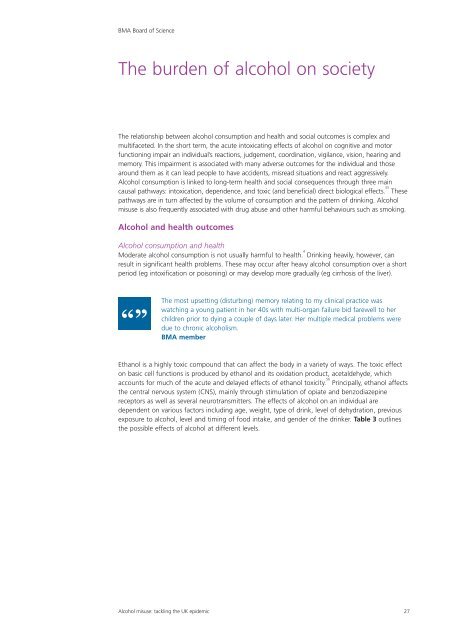Alcohol misuse: tackling the UK epidemic - London
Alcohol misuse: tackling the UK epidemic - London
Alcohol misuse: tackling the UK epidemic - London
You also want an ePaper? Increase the reach of your titles
YUMPU automatically turns print PDFs into web optimized ePapers that Google loves.
BMA Board of Science<br />
The burden of alcohol on society<br />
The relationship between alcohol consumption and health and social outcomes is complex and<br />
multifaceted. In <strong>the</strong> short term, <strong>the</strong> acute intoxicating effects of alcohol on cognitive and motor<br />
functioning impair an individual’s reactions, judgement, coordination, vigilance, vision, hearing and<br />
memory. This impairment is associated with many adverse outcomes for <strong>the</strong> individual and those<br />
around <strong>the</strong>m as it can lead people to have accidents, misread situations and react aggressively.<br />
<strong>Alcohol</strong> consumption is linked to long-term health and social consequences through three main<br />
causal pathways: intoxication, dependence, and toxic (and beneficial) direct biological effects. 55<br />
These<br />
pathways are in turn affected by <strong>the</strong> volume of consumption and <strong>the</strong> pattern of drinking. <strong>Alcohol</strong><br />
<strong>misuse</strong> is also frequently associated with drug abuse and o<strong>the</strong>r harmful behaviours such as smoking.<br />
<strong>Alcohol</strong> and health outcomes<br />
<strong>Alcohol</strong> consumption and health<br />
Moderate alcohol consumption is not usually harmful to health. 4<br />
Drinking heavily, however, can<br />
result in significant health problems. These may occur after heavy alcohol consumption over a short<br />
period (eg intoxification or poisoning) or may develop more gradually (eg cirrhosis of <strong>the</strong> liver).<br />
“”<br />
The most upsetting (disturbing) memory relating to my clinical practice was<br />
watching a young patient in her 40s with multi-organ failure bid farewell to her<br />
children prior to dying a couple of days later. Her multiple medical problems were<br />
due to chronic alcoholism.<br />
BMA member<br />
Ethanol is a highly toxic compound that can affect <strong>the</strong> body in a variety of ways. The toxic effect<br />
on basic cell functions is produced by ethanol and its oxidation product, acetaldehyde, which<br />
accounts for much of <strong>the</strong> acute and delayed effects of ethanol toxicity. 56<br />
Principally, ethanol affects<br />
<strong>the</strong> central nervous system (CNS), mainly through stimulation of opiate and benzodiazepine<br />
receptors as well as several neurotransmitters. The effects of alcohol on an individual are<br />
dependent on various factors including age, weight, type of drink, level of dehydration, previous<br />
exposure to alcohol, level and timing of food intake, and gender of <strong>the</strong> drinker. Table 3 outlines<br />
<strong>the</strong> possible effects of alcohol at different levels.<br />
<strong>Alcohol</strong> <strong>misuse</strong>: <strong>tackling</strong> <strong>the</strong> <strong>UK</strong> <strong>epidemic</strong> 27
















